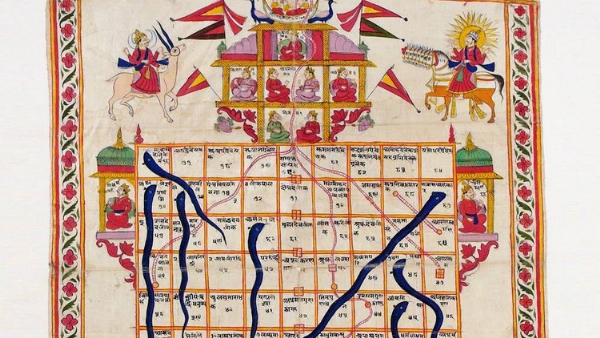Vishwaguru Bharat 3: From Moksha Patam to 'Snakes & Ladders'
The origins of Snakes & Ladders can be traced back over two millennia to ancient India. In its original form, the game was known as "Moksha Patam" or "Mokshapat."
Total Views |
The game 'Snakes & Ladders' is a timeless board game that weaves luck and strategy into a tapestry of entertainment. It is a classic example of the way cultural traditions can transcend borders. Originating in ancient India, this game has traversed continents, captivating hearts and minds across cultures. The third article of the series 'Vishwaguru Bharat', digs into the origins of Snakes & Ladders in India and its subsequent spread across the world.

Ancient Roots: India's Gift to Leisure
The origins of Snakes & Ladders can be traced back over two millennia to ancient India. In its original form, the game was known as "Moksha Patam" or "Mokshapat," with "Moksha" referring to liberation or enlightenment and "Patam" denoting a board. The game's conceptual framework embodies the spiritual journey, wherein players navigate a path marked by virtues and vices, aiming to ascend to higher levels of consciousness (ladders) while avoiding pitfalls that lead to spiritual regression (snakes). This connection to moral values and spiritual growth showcases the depth of thought embedded within the game's design.
Symbolism and Moral Lessons
The spiritual symbolism of Snakes & Ladders extends beyond the physical board. The ladders symbolize positive virtues like generosity, kindness, and righteousness, while the snakes represent negative traits such as greed, anger, and deceit. Players learn valuable moral lessons while playing, reinforcing the game's cultural significance. This interplay between entertainment and ethical education mirrors the rich philosophical traditions of India.
Journey Beyond Borders: Global Spread
The global journey of Snakes & Ladders began through the trade routes and cultural exchanges that connected ancient India to the world. Historical records indicate that the game's existence was known in Persia by the 12th century, where it was called "Ghadam Taash." The game's introduction to Europe came during the colonial era, with the British East India Company playing a pivotal role in transporting Indian cultural artifacts, including games like Snakes & Ladders, back to Europe.
Adaptation and Evolution
As the game traveled across continents, it underwent various adaptations and name changes. In England, it became popular in the 19th century under the name "Snakes & Ladders," with the moralistic aspects toned down and the focus shifted toward entertainment. Similarly, the game found its way to the United States, where it gained popularity as a family pastime.
Cultural Impact and Educational Value
Snakes & Ladders transcended cultural boundaries due to its simple rules, universal themes, and relatable elements. It became a favorite among people of all ages, offering not only entertainment but also a subtle way of teaching life lessons. The game's accessibility made it a tool for parents and educators to impart values and basic counting skills to children.
Digital Age Revival and Modern Significance
In the modern era, Snakes & Ladders has experienced a digital revival. Digital versions of the game are widely available on smartphones and computers, making it accessible to a new generation. This resurgence speaks to the timeless appeal of the game's mechanics and the adaptability of its core concepts.
Cultural Exchange and Shared Heritage
The global spread of Snakes & Ladders is a testament to the enduring power of cultural exchange. As it journeyed across nations and continents, the game forged connections and created a shared cultural heritage. Its simple gameplay and inherent moral values made it a bridge between cultures, fostering understanding and camaraderie among people from different walks of life.
Snakes & Ladders, born from the spiritual depths of ancient India, has evolved into a beloved global pastime that transcends time and cultural boundaries. Its journey from Moksha Patam to the digital realm represents a fusion of entertainment, education, and cultural exchange.
--

